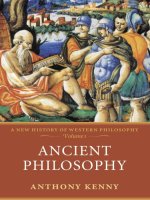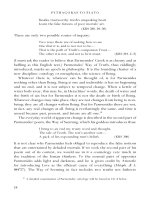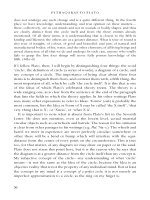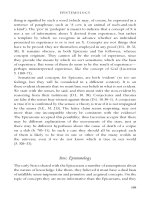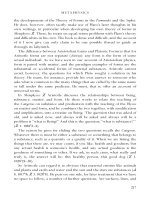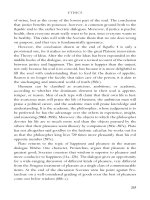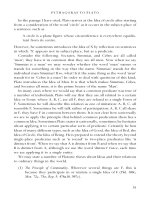- Trang chủ >>
- Khoa Học Tự Nhiên >>
- Vật lý
ancient philosophy a new history of western philosophy volume 1 sep 2004
Bạn đang xem bản rút gọn của tài liệu. Xem và tải ngay bản đầy đủ của tài liệu tại đây (6.34 MB, 364 trang )
Ancient Philosophy
This is the remarkable story of the birth of philosophy, its flourishing in
the ancient Mediterranean world, and the development of ideas which
have shaped the course of Western thought and society.
Sir Anthony Kenny’s stimulating account begins with Pythagoras and
Thales, and ends with St Augustine, who handed on the torch of
philosophy to the Christian age. At the centre of the narrative are the
two great Wgures of Plato and Aristotle, who between them set the agenda
for philosophy for the next two millenia, and whose influence is as
profound today as eve r.
The fruit of a lifetime’s scholarship and insight, Ancient Philosophy sets the
philosophers and their ideas in historical context, and explains the
signiWcance and impact of each wave of new ideas. It is the first volume
in a magisterial new series, which brings the history of philosophy alive to
anyone who wants to understand the roots of Western civilization.
Sir Anthony Kenny has been President of the British Academy, and
Pro-Vice-Chancellor of the University of Oxford. He has written many
acclaimed books on the philosophy of mind, the philosophy of religion,
and the history of philosophy, including both scholarly and popular
works on Aristotle, Aquinas, Descartes, and Wittgenstein.
A New History of Western Philosophy
Anthony Kenny
Volume 1: Ancient Philosophy Volume 3: The Rise of Modern Philosophy
Volume 2: Medieval Philosophy Volume 4: Philosophy in the Modern World
This page intentionally left blank
A NEW HISTORY OF WESTERN PHILOSOPHY
volume 1
Ancient Philosophy
anthony
kenny
CLARENDON PRESS Á OXFORD
3
Great Clarendon Street, Oxford ox26dp
Oxford University Press is a department of the University of Oxford.
It furthers the University’s objective of excellence in research, scholarship,
and education by publishing worldwide in
Oxford New York
Auckland Cape Town Dar es Salaam Hong Kong Karachi
Kuala Lumpur Madrid Melbourne Mexico City Nairobi
New Delhi Shanghai Taipei Toronto
With oYces in
Argentina Austria Brazil Chile Czech Republic France Greece
Guatemala Hungary Italy Japan Poland Portugal Singapore
South Korea Switzerland Thailand Turkey Ukraine Vietnam
Oxford is a registered trade mark of Oxford University Press
in the UK and in certain other countries
Published in the United States
by Oxford University Press Inc., New York
ß Sir Anthony Kenny 2004
The moral rights of the author have been asserted
Database right Oxford University Press (maker)
First published 2004
First published in paperback 2006
All rights reserved. No part of this publication may be reproduced,
stored in a retrieval system, or transmitted, in any form or by any means,
without the prior permission in writing of Oxford University Press,
or as expressly permitted by law, or under terms agreed with the appropriate
reprographics rights organization. Enquiries concerning reproduction
outside the scope of the above should be sent to the Rights Department,
Oxford University Press, at the address above
You must not circulate this book in any other binding or cover
and you must impose this same condition on any acquirer
British Library Cataloguing in Publication Data
Data available
Library of Congress Cataloging in Publication Data
Data available
Typeset by SPI Publisher Services, Pondicherry, India
Printed in Great Britain on acid-free paper by
Biddles Ltd., King’s Lynn
ISBN 0–19–875273–3 978–0–19–875273–8
ISBN 0–19–875272–5 (Pbk.) 978–0–19–875272–1 (Pbk.)
13579108642
SUMMARY OF CONTENTS
List of Contents vii
Map x
Introduction xi
1. Beginnings: From Pythagoras to Plato 1
2. Schools of Thought: From Aristotle to Augustine 65
3. How to Argue: Logic 116
4. Knowledge and its Limits: Epistemology 145
5. How Things Happen: Physics 178
6. What There Is: Metaphysics 199
7. Soul and Mind 229
8. How to Live: Ethics 257
9. God 289
Chronology 317
List of Abbreviations and Conventions 319
Bibliography 323
List of Illustrations 331
Index 335
This page intentionally left blank
CONTENTS
Map x
Introduction xi
1. Beginnings: From Pythagoras to Plato 1
The Four Causes 1
The Milesians 4
The Pythagoreans 9
Xenophanes 11
Heraclitus 12
Parmenides and the Eleatics 17
Empedocles 20
Anaxagoras 24
The Atomists 26
The Sophists 28
Socrates 32
The Socrates of Xenophon 35
The Socrates of Plato 37
Socrates’ Own Philosophy 41
From Socrates to Plato 45
The Theory of Ideas 49
Plato’s Republic 56
The Laws and the Timaeus 60
2. Schools of Thought: From Aristotle to Augustine 65
Aristotle in the Academy 65
Aristotle the Biologist 69
The Lyceum and its Curriculum 73
Aristotle on Rhetoric and Poetry 75
Aristotle’s Ethical Treatises 79
Aristotle’s Political Theory 82
Aristotle’s Cosmology 87
The Legacy of Aristotle and Plato 89
Aristotle’s School 91
Epicurus 94
Stoicism 96
Scepticism in the Academy 100
Lucretius 101
Cicero 103
Judaism and Christianity 104
The Imperial Stoa 106
Early Christian Philosophy 109
The Revival of Platonism and Aristotelianism 111
Plotinus and Augustine 112
3. How to Argue: Logic 116
Aristotle’s Syllogistic 117
The de Interpretatione and the Categories 123
Aristotle on Time and Modality 129
Stoic Logic 136
4. Knowledge and its Limits: Epistemology 145
Presocratic Epistemology 145
Socrates, Knowledge, and Ignorance 148
Knowledge in the Theaetetus 152
Knowledge and Ideas 156
Aristotle on Science and Illusion 161
Epicurean Epistemology 166
Stoic Epistemology 169
Academic Scepticism 173
Pyrrhonian Scepticism 175
5. How Things Happen: Physics 178
The Continuum 178
Aristotle on Place 182
Aristotle on Motion 184
Aristotle on Time 186
Aristotle on Causation and Change 189
The Stoics on Causality 192
Causation and Determinism 194
Determinism and Freedom 196
6. What There Is: Metaphysics 199
Parmenides’ Ontology 200
CONTENTS
viii
Plato’s Ideas and their Troubles 205
Aristotelian Forms 216
Essence and Quiddity 218
Being and Existence 223
7. Soul and Mind 229
Pythagoras’ Metempsychosis 229
Perception and Thought 232
Immortality in Plato’s Phaedo 234
The Anatomy of the Soul 237
Plato on Sense-Perception 240
Aristotle’s Philosophical Psychology 241
Hellenistic Philosophy of Mind 248
Will, Mind, and Soul in Late Antiquity 251
8. How to Live: Ethics 257
Democritus the Moralist 257
Socrates on Virtue 260
Plato on Justice and Pleasure 264
Aristotle on Eudaimonia 266
Aristotle on Moral and Intellectual Virtue 269
Pleasure and Happiness 274
The Hedonism of Epicurus 277
Stoic Ethics 280
9. God 289
Xenophanes’ Natural Theology 289
Socrates and Plato on Piety 290
Plato’s Evolving Theology 293
Aristotle’s Unmoved Movers 296
The Gods of Epicurus and the Stoics 302
On Divination and Astrology 308
The Trinity of Plotinus 311
Chronology 317
List of Abbreviations and Conventions 319
Bibliography 323
List of Illustrations 331
Index 335
CONTENTS
ix
W
hy should one study the history of philosophy? There are many
reasons, but they fall into two groups: philosophical and historical.
We may study the great dead philosophers in order to seek illumination
upon themes of present-day philosophical inquiry. Or we may wish to
understand the people and societies of the past, and read their philosophy
to grasp the conceptual climate in which they thought and acted. We may
read the philosophers of other ages to help to resolve philosophical
problems of abiding concern, or to enter more fully into the intellectual
world of a bygone era.
In this history of philosophy, from the beginnings to the present
day, I hope to further both purposes, but in diVerent ways in di Verent
parts of the work, as I shall try to make clear in this Introduction. But
before outlining a strategy for writing the history of philosophy, one must
pause to reXect on the nature of philosophy itself. The word ‘philosophy’
means diVerent things in diVerent mouths, and correspondingly ‘the
history of philosophy’ can be interpreted in ma ny ways. What it signiWes
depends on what the particular historian regards as being essential to
philosophy.
This was true of Aristotle, who was philosophy’s Wrst historian, and of
Hegel, who hoped he would be its last , since he was bringing philosophy to
perfection. The two of them had very diVerent views of the nature of
philosophy. Nonetheless, they had in common a view of philosophical
progress: philosophical problems in the course of history became ever
more clearly deWned, and they could be answered with ever greater
accuracy. Aristotle in the Wrst book of his Metaphysics and Hegel in his
Lectures on the History of Philosophy saw the teachings of the earlier philosophers
they recorded as halting steps in the direction of a vision they were
themselves to expound.
Only someone with supreme self-conWdence as a philosopher could
write its history in such a way. The temptation for most philosopher
historians is to see philosophy not as culminating in their own work, but
rather as a gradual progress to whatever philosophical system is currently
in fashion. But this temptation should be resisted. There is no force that
guarantees philosophical progress in any particular direction.
Indeed, it can be called into question whether philosophy makes any
progress at all. The major philosophical problems, so me say, are all still
being debated after centuries of discussion, and are no nearer to any
deWnitive resolution. In the twentieth century the philosopher Ludwig
Wittgenstein wrote:
You always hear people say that philosophy makes no progress and that the same
philosophical problems which were already preoccupying the Greeks are still
troubling us today. But people who say that do not understand the reason why
it has to be so. The reason is that our language has remained the same and always
introduces us to the same questions. I read ‘philosophers are no nearer to the
meaning of ‘‘reality’’ than Plato got’. What an extraordinary thing! How remark-
able that Plato could get so far! Or that we have not been able to get any further!
Was it because Plato was so clever? (MS 213/424)
The diVerence between what we might call the Aristotelian and the
Wittgensteinian attitude to progress in philosophy is linked with two
diVerent views of philosophy itself. Philosophy may be viewed as a science,
on the one hand, or as an art, on the other. Philosophy is, indeed, uniquely
diYcult to classify, and resembles both the arts and the sciences.
On the one hand, philosophy seems to be like a science in that the
philosopher is in pursuit of truth. Discoveries, it seems, are made in
philosophy, and so the philosopher, like the scientist, has the excitement
of belonging to an ongoing, cooperative, cumulative intellectual venture. If
so, the philosopher must be familiar with current writing, and keep abreast
of the state of the art. On this view, we twenty-Wrst-century philosophers
have an advantage over earlier practitioners of the discipline. We stand, no
doubt, on the shoulders of other and greater philosophers, but we do stand
above them. We have superannuated Plato and Kant.
On the other hand, in the arts, classic works do not date. If we want to
learn physics or chemistry, as opposed to their history, we don’t nowadays
read Newton or Faraday. But we read the literature of Homer and Shake-
speare not merely to learn about the quaint things that passed through
people’s minds in far-oV days of long ago. Surely, it may well be argued, the
same is true of philosophy. It is not merely in a spirit of antiquarian
curiosity that we read Aristotle today. Philosophy is essentially the work
xii
INTRODUCTION
of individual genius, and Kant does not supersede Plato any more than
Shakespeare supersedes Homer.
There is truth in each of these accounts, but neither is wholly true and
neither contains the whole truth. Philosophy is not a science, and there is
no state of the art in philosophy. Philosophy is not a matter of expanding
knowledge, of acquiring new truths about the world; the philosopher is
not in possession of information that is denied to others. Philosophy is not
a matter of knowledge, it is a matter of understanding, that is to say, of
organizing what is known. But because philosophy is all-embracing, is so
universal in its Weld, the organization of knowledge it demands is some-
thing so diYcult that only genius can do it. For all of us who are not
geniuses, the only way in which we can hope to come to grips with
philosophy is by reaching up to the mind of some great philosopher of
the past.
Though philosophy is not a science, throughout its history it has had an
intimate relation to the sciences. Many disciplines that in antiquity and in
the Middle Ages were part of philosophy have long since become inde-
pendent sciences. A discipline remains philosophical as long as its concepts
are unclariWed and its methods are controversial. Perhaps no scientiWc
concepts are ever fully clariWed, and no scientiWc methods are ever totally
uncontroversial; if so, there is always a philosophical element left in every
science. But once problems can be unproblematical ly stated, when con-
cepts are uncontroversially standardized, and where a consensus emerges
for the methodology of solution, then we have a science setting up home
independently, rather than a branch of philosophy.
Philosophy, once called the queen of the sciences, and once called their
handmaid, is perhaps better thought of as the womb, or the midwife, of the
sciences. But in fact sciences emerge from philosophy not so much by
parturition as by Wssion. Two exampl es, out of many, may serve to
illustrate this.
In the seventeenth century philosophers were much exercised by the
problem which of our ideas are innate and which are acquired. This
problem split into two problems, one psychological (‘What do we owe to
heredity and what do we owe to environment?’) and one belonging to the
theory of knowledge (‘How much of our knowledge depends on experi-
ence and how much is independent of it?’). The Wrst question was handed
over to scientiWc psychology, the second question remained philosophical.
xiii
INTRODUCTION
But the second question itself split into a number of questions, one of
which was ‘Is mathematics merely an extension of logic, or is it an
independent body of truth?’ The question whether mathematics could be
derived from pure logic was given a precise answer by the work of logicians
and mathematicians in the twentieth century. The answer was not philo-
sophical, but mathematical. So here we had an initial, confused, philosoph-
ical question which ramiWed in two directions—towards psychology and
towards mathematics. There remains in the middle a philosophical residue
to be churned over, concerning the nature of mathematical propositions.
An earlier example is more complicated. A branch of philosophy given
an honoured place by Aristotle is ‘theology’. When today we read what he
says, the discipline appears a mixture of astronomy and philosophy of
religion. Christian and Muslim Aristotelians added to it elements drawn
from the teaching of their sacred books. It was when St Thomas Aquinas,
in the thirteenth century, drew a sharp distinction between natural and
revealed theology that the Wrst important Wssion took place, removing
from the philosophical agenda the appeals to revelation. It took rather
longer for the astronomy and the natural theology to separate out from
each other. This example shows that what may be sloughed oV by philoso-
phy need not be a science but may be a humanistic discipline such as
biblical studies. It also shows that the history of philosophy contains
examples of fusion as well as of Wssion.
Philosophy resembles the arts in having a signiWcant relation to a canon.
A philosopher situates the problems to be addressed by reference to a series
of classical texts. Because it has no speciWc subject matter, but only
characteristic methods, philosophy is deWned as a discipline by the activities
of its great practitioners. The earliest people whom we recognize as
philosophers, the Presocratics, were also scientists, and several of them
were also religious leaders. They did not yet think of themselves as
belonging to a common profession, the one with which we twenty-
Wrst-century philosophers claim continuity. It was Plato who in his
writings Wrst used the word ‘philosophy’ in some approximation to our
modern sense. Those of us who call ourselves philosophers today can
genuinely lay claim to be the heirs of Plato and Aristotle. But we are
only a small subset of their heirs. What distinguishes us from the other
heirs of the great Greeks, and what entitles us to inherit their name, is that
unlike the physicists, the astronomers, the medics, the linguists, we phil-
xiv
INTRODUCTION
osophers pursue the goals of Plato and Aristotle only by the same methods
as were already available to them.
If philosophy lies somewhere between the sciences and the arts, what is
the answer to the question ‘Is there progress in philosophy?’
There are those who think that the major task of philosophy is to cure
us of intellectual confusion. On this, modest, view of the philosopher’s
role, the tasks to be addressed diVer across history, since each period needs
adiVerent form of therapy. The knots into which the undisciplined mind
ties itself diVer from age to age, and diVerent mental motions are necessary
to untie the knots. A prevalent malady of our own age, for instance, is the
temptation to think of the mind as a computer, whereas earlier ages were
tempted to think of it as a telephone exchange, a pedal organ, a homun-
culus, or a spirit. Maladies of earlier ages may be dormant, such as belief
that the stars are living beings; or they may return, such as the belief that
the stars enable one to predict human behaviour.
The therapeutic view of philosophy, however, may seem to allow only
for variation over time, not for genuine progress . But that is not necessarily
true. A confusion of thought may be so satisfactorily cleared up by a
philosopher that it no longer oVers temptation to the unwary thinker.
One such example will be considered at length in the Wrst volume of this
history. Parmenides, the founder of the discipline of ontology (the science
of being), based much of his system on a systematic confusion between
diVerent senses of the verb ‘to be’. Plato, in one of his dialogues, sorted out
the issues so successfully that there has never again been an excuse for
mixing them up: indeed, it now takes a great eVort of philosophical
imagination to work out exactly what led Parmenides into confusion in
the Wrst place.
Progress of this kind is often concealed by its very success: once a
philosophical problem is resolved, no one regards it as any more a matter
of philosophy. It is like treason in the epigram: ‘Treason doth never
prosper, what’s the reason? j For if it prosper none dare call it treason.’
The most visible form of philosophical progress is progress in philosoph-
ical analysis. Philosophy does not progress by making regular additions to a
quantum of information; as has been said, what philosophy oVers is not
information but understanding. Contemporary philosophers, of course,
know some things that the greatest philosophers of the past did not know;
but the things that they know are not philosophical matters but the truths
xv
INTRODUCTION
that have been discovered by the sciences begotten of philosophy. But there
are also some things that philosophers of the present day understand
which even the greatest philosophers of earlier generations failed to
understand. For instance, philosophers clarify language by distinguishing
between diVerent senses of words; and once a distinction has been made,
future philosophers have to take account of it in their deliberations.
Take, as an example, the issue of free will. At a certain point in the
history of philosophy a distinction was made between two kinds of human
freedom: liberty of indiVerence (ability to do otherwise) and liberty of
spontaneity (ability to do what you want). Once this distinction has been
made the question ‘Do human beings enjoy freedom of the will?’ has to be
answered in a way that takes account of the distinction. Even someone who
believes that the two kinds of liberty coincide has to provide arguments to
show this; he cannot simply ignore the distinction and hope to be taken
seriously on the topic.
It is unsurprising, given the relationship of philosophy to a canon, that
one notable form of philosophical progress consists in coming to terms
with, and interpreting, the thoughts of the great philosophers of the past.
The great works of the past do not lose their importance in philosophy—
but their intellectual contributions are not static. Each age interprets and
applies philosophical classics to its own problems and aspirations. This is, in
recent years, most visible in the Weld of ethics. The ethical works of Plato
and Aristotle are as inXuential in moral thinking today as the works of any
twentieth-century moralists—this is easily veriWed by taking any citation
index—but they are being interpreted and applied in ways quite diVerent
from the ways in which they were applied in the past. These new inter-
pretations and applications do eVect a genuine advance in our understand-
ing of Plato and Aristotle; but of course it is understanding of quite a
diVerent kind from what is given by a new study of the chronology of
Plato’s dialogues or a stylometric comparison between Aristotle’s various
ethical works. The new light we receive resembles rather the enhanced
appreciation of Shakespeare we may get by seeing a new and intelligent
production of King Lear.
The historian of philosophy, whether primarily interested in philosophy
or primarily interested in history, cannot help being both a philosopher
and a historian. A historian of painting does not have to be a painter; a
historian of medicine does not, qua historian, practise medicine. But a
xvi
INTRODUCTION
historian of philosophy cannot help doing philosophy in the very writing of
history. It is not just that someone who knows no philosophy will be a bad
historian of philosophy; it is equally true that someone who has no idea of
how to cook will be a bad historian of cookery. The link between philosophy
and its history is a far closer one. The historical task itself forces historians of
philosophy to paraphrase their subjects’ opinions, to oVer reasons why past
thinkers held the opinions they did, to speculate on the premisses left tacit
in their arguments, and to evaluate the coherence and cogency of
the inferences they drew. But the supplying of reasons for philosophical
conclusions, the detection of hidden premisses in philosophical arguments,
and the logical evaluation of philosophical inferences are themselves
full-blooded philosophical activities. Consequently, any serious history of
philosophy must itself be an exercise in philosophy as well as in history.
On the other hand, the historian of philosophy must have a knowledge
of the historical context in which past philosophers wrote their works.
When we explain historical actions, we ask for the agent’s reasons; if we Wnd
a good reason, we think we have understood his action. If we conclude he
did not have good reason, even in his own terms, we have to Wnd, diVerent,
more complicated explanations. What is true of action is true of taking a
philosophical view. If the philosophical historian Wnds a good reason for
a past philosopher’s doctrine, then his task is done. But if he concludes that
the past philosopher has no good reason, he has a further and much more
diYcult task, of explaining the doctrine in terms of the context in which it
appeared—social, perhaps, as well as intellectual.1
History and philosophy are closely linked even in the Wrst-hand quest
for original philosophical enlightenment. In modern times this has been
most brilliantly illustrated by the masterpiece of the great nineteenth-
century German philosopher Gottlob Frege, The Foundations of Arithmetic.
Almost half of Frege’s book is devoted to discussing and refuting the
view of other philosophers and mathematicians. While he is discussing
the opinions of others, he ensures that some of his own insights are artfully
insinuated, and this makes easier the eventual presentation of his own
theory. But the main purpose of his lengthy polemic is to convince readers
of the seriousness of the problems to which he will later oVer solutions.
1 The magnitude of this task is well brought out by Michael Frede in the introduction to his
Essays in Ancient Philosophy (Oxford: Clarendon Press, 1987).
xvii
INTRODUCTION
Without this preamble, he says, we would lack the Wrst prerequisite for
learning anything: knowledge of our own ignorance.
Most histories of philosophy, in this age of specialization, are the work
of many hands, specialists in diVerent Welds and periods. In inviting me
to write, single-handed, a history of philosophy from Thales to Derrida,
Oxford University Press gave expression to the belief that there is
something to be gained by presenting the development of philosophy
from a single viewpoint, linking ancient, medieval, early modern, and
contemporary philosophy into a single narrative concerned with con-
nected themes. The work will appear in four volumes: the Wrst will
cover the centuries from the beginning of philosophy up to the conver-
sion of St Augustine in ad 387. The second will take the story from
Augustine up to the Lateran Council of 1512. The third will end with
the death of Hegel in 1831. The fourth and Wnal volume will bring the
narrative up to the end of the second millennium.
Obviously, I cannot claim to be an expert on all the many philosophers
whom I will discuss in the volumes of this work. However, I have published
books on major Wgures within each of the periods of the four volumes: on
Aristotle (The Aristotelian Ethics and Aristotle on the Perfect Life), on Aquinas
(Aquinas on Mind and Aquinas on Being), on Descartes (Descartes: A Study of his
Philosophy and Descartes: Philosophical Letters), and on Frege and Wittgenstein
(Frege and Wittgenstein as Penguin introductions and The Legacy of Wittgenstein).
I hope that the work that went into the writing of these books gave me an
insight into the philosophical style of four diVerent eras in the history of
philosophy. It certainly gave me a sense of the perennial importance of
certain philosophical problems and insights.
I hope to write my history in a manner that takes account of the points I
have raised in this Introduction. I do not suVer from any Whiggish illusion
that the current state of philosophy represents the highest point of
philosophical endeavour yet reached. On the contrary, my primary pur-
pose in writing the book is to show that in many respects the philosophy of
the great dead philosophers has not dated, and that today one may gain
philosophical illumination by a careful reading of the great works that we
have been privileged to inherit.
The kernel of any kind of historiography of philosophy is exegesis: the
close reading and interpretation of philosophical texts. Exegesis may be of
two kinds, internal or external. In internal exeges is the interpreter tries to
xviii
INTRODUCTION
render the text coherent and consistent, making use of the principle of
charity in interpretation. In external exegesis the interpreter seeks to bring
out the signiWcance of the text by comparing it and contrasting it with
other texts.
Exegesis may form the basis of the two quite diVerent historical endeav-
ours that I described at the beginning of this Introduction. In one, which
we may call historical philosophy, the aim is to reach philosophical truth,
or philosophical understanding, about the matter or issue under discussion
in the text. Typically, historical philosophy looks for the reasons behind, or
the justiWcation for, the statements made in the text under study. In the
other endeavour, the history of ideas, the aim is not to reach the truth
about the matter in hand, but to reach the understanding of a person or an
age or a historical succession. Typically the historian of ideas looks not for
the reasons so much as the sources, or causes, or motives, for saying what is
said in the target text.
Both of these disciplines base themselves on exegesis, but of the two, the
history of ideas is the one most closely bound up with the accuracy and
sensitivity of the reading of the text. It is possible to be a good philosopher
while being a poor exegete. At the beginning of his Philosophical Investigations
Wittgenstein oVers a discussion of St Augustine’s theory of language. What
he writes is very dubious exegesis; but this does not weaken the force of his
philosophical criticism of the ‘Augustinian’ theory of language. But Witt-
genstein did not really think of himself as engaged in historical philosophy,
any more than he thought of himself as engaged in the historiography of
ideas. The invocation of the great Augustine as the author of the mistaken
theory is intended merely to indicate that the error is one that is worth
attacking.
In diVerent histories of philosophy the skills of the historian and those of
the philosopher are exercised in diVerent proportions. The due proportion
varies in accordance with the purpose of the work and the Weld of
philosophy in question. The pursuit of historical understanding and the
pursuit of philosophical enlightenment are both legitimate approaches to
the history of philosophy, but both have their dangers. Historians who
study the history of thought without being themselves involved in the
philosophical problems that exercised past philosophers are likely to sin by
superWciality. Philosophers who read ancient, medieval, or early modern
texts without a knowledge of the historical context in which they were
xix
INTRODUCTION
written are likely to sin by anachronism. Rare is the historian of philosophy
who can tread Wrmly without falling into either trap.
Each of these errors can nullify the purpose of the enterprise. The
historian who is unconcerned by the philosophical problems that troubled
past writers has not really understood how they themselves conducted
their thinking. The philosopher who ignores the historical background of
past classics will gain no fresh light on the issues that concern us today, but
merely present contemporary prejudices in fancy dress.
The two dangers threaten in diVerent proportions in diVerent areas of
the history of philosophy. In the area of metaphysics it is superWciality
which is most to be guarded against: to som eone without a personal
interest in fundamental philosophical problems the systems of the great
thinkers of the past will seem only quaint lunacy. In political philosophy
the great danger is anachronism: when we read Plato’s or Aristotle’s
criticisms of democracy, we shall not make head or tail of them unless
we know something about the institutions of ancient Athens. In between
metaphysics and political philosophy stand ethics and philosophy of mind:
here both dangers threaten with roughly equal force.
I shall attempt in these volumes to be both a philosophical historian and
a historical philosopher. Multi-authored histories are sometimes struc-
tured chronologically and sometimes structured thematically. I shall try
to combine both approaches, oVering in each volume Wrst a chronological
survey, and then a thematic treatment of particular philosophical topics of
abiding importance. The reader whose primary interest is historical will
focus on the chronological survey, referring where necessary to the
thematic sections for ampliWcation. The reader who is more concerned
with the philosophical issues will concentrate rather on the thematic
sections of the volumes, referring back to the chronological surveys to
place particular issues in context.
Thus in this Wrst volume I oVer in the Wrst part a conventional chrono-
logical tour from Pythagoras to Augustine, and in the second part a
more detailed treatment of topics where I believe we have still much to
learn from our predecessors in classical Greece and imperial Rome.
The topics of these thematic sections have been chosen partly with an eye
to the devel opment of the same themes in the volumes that are yet
to come.
xx
INTRODUCTION
The audience I have in mind is at the level of second- or third-year
undergraduate study. I realize, however, that many of those interested in
the history of philosophy may themse lves be enrolled in courses that are
not primarily philosophical. Accordingly, I shall do my best not to assume
a familiarity with contemporary philosophical techniques or terminology. I
aim also to write in a manner clear and light-hearted enough for the
history to be enjoyed by those who read it not for curricular purposes but
for their own enlightenmen t and entertainment.
xxi
INTRODUCTION
This page intentionally left blank
1
Beginnings:
From Pythagoras to Plato
T
he history of philosophy does not begin with Aristotle, but the
historiography of philosophy does. Aristotle was the Wrst philosopher
who systematically studied, recorded, and criticized the work of previous
philosophers. In the Wrst book of the Metaphysics he summarizes the
teachings of his predecessors, from his distant intellectual ancestors
Pythagoras and Thales up to Plato, his teacher for twenty years. To this
day he is one of the most copious, and most reliable, sources of our
information about philosophy in its infancy.
The Four Causes
Aristotle oVers a classiWcation of the earliest Greek philosophers in
accordance with the structure of his system of the four causes. ScientiWc
inquiry, he believed, was above all inquiry into the causes of things;
and there were four diVerent kinds of cause: the material cause, the
eYcient cause, the formal cause, and the Wnal cause. To give a crude
illustration of what he had in mind: when Alfredo cooks a risotto, the
material causes of the risotto are the ingredients that go into it, the eYcient
cause is the chef himself, the recipe is the formal cause, and the satisfaction
of the clients of his restaurant is the Wnal cause. Aristotle believed that a
scientiWc understanding of the universe demanded an inquiry into the
operation in the world of causes of each of these kinds (Metaph. A 3.
983a24–b17).
Early philoso phers on the Greek coast of Asia Minor concentrated on
the material cause: they sought the basic ingredients of the world we live
in. Thales and his successors posed the following question: At a fundamen -
tal level is the world made out of water, or air, or Wre, or earth, or a
combination of some or all of these? (Metaph. A 3. 983b20–84 a16). Even if we
have an answer to this question, Aristotle thought, that is clearly not
enough to satisfy our scientiWc curiosity. The ingredients of a dish do
not put themselves together: there needs to be an agent operatin g upon
them, by cutting, mixing, stirring, heating, or the like. Some of these early
philosophers, Aristotle tells us, were aware of this and oVered conjectures
about the agents of change and development in the world. Sometimes it
would be one of the ingredients themselves—W re was perhaps the most
promising suggestion, as being the least torpid of the elements. More often
it would be some agent, or pair of agents, both more abstract and more
picturesque, such as Love or Desire or Strife, or the Good and the Bad
(Metaph. A 3–4. 984b8–31).
Meanwhile in Italy—again according to Aristotle—there were, around
Pythagoras, mathematically inclined philosophers whose inquiries took
quite a diVerent course. A recipe, besides naming ingredients, will contain
a lot of numbers: so many grams of this, so many litres of that. The
Pythagoreans were more interested in the numbers in the world’s recipe
than in the ingredients themselves. They supposed, Aristotle says, that the
elements of numbers were the elements of all things, and the whole of the
heavens was a musical scale. They were inspired in their quest by their
discovery that the relationship between the notes of the scale played on a
lyre corresponded to diVerent numerical ratios between the lengths of the
strings. They then generalized this idea that qualitative diVerences might
be the upshot of numerical diVerences. Their inquiry, in Aristotle’s terms,
was an inquiry into the formal causes of the universe. (Meta ph. A 5. 985b23–
986b2)
Coming to his immediate predecessors, Aristotle says that Socrates
preferred to concentrate on ethics rather than study the world of nature,
while Plato in his philosophical theory combined the approaches of
the schools of both Thales and Pythagoras. But Plato’s Theory of Ideas,
while being the most comprehensive scientiWc system yet devised, seemed
to Aristotle—for reasons that he summarizes here and develops in a
number of his treatises—to be unsatisfactory on several grounds. There
PYTHAGORAS TO PLATO
2
